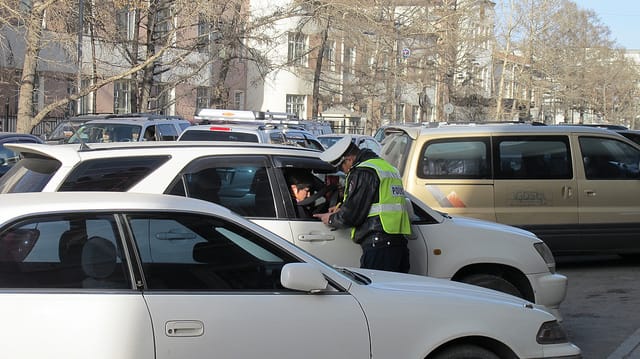
Tips on How To Read Your Traffic Ticket
Start reading an Ohio traffic ticket at the bottom. The last line on the standard form indicates whether you need to appear in court to answer to the alleged offense or accept a sentence for a guilty plea. If the police officer or state trooper who issued you the ticket checked YES to the question “Personal Appearance Required,” you need to go before a judge.
Traffic offenses that always require court appearances include:
- Operating a vehicle while intoxicated (OVI)
- Driving with an open container of alcohol in the vehicle
- Physical control, which means sitting in the driver’s seat and holding the keys while under the influence of alcohol or drugs
- Reckless operation
- Speeding at 26 mph or more over the speed limit
- Speeding at 16 mph or more over the speed limit in a school zone
- Possessing more than one license of the same class
- Driving a vehicle without the owner’s permission
- Failing to stop after getting involved in an accident on a public street
- Driving with a suspended license or violating restriction on a restricted license
Ohio considers most of these criminal offenses that are punishable by jail sentences in addition to fines. If you are ordered to appear in court and face incarceration in Franklin County, you will benefit from consulting with a Columbus traffic lawyer who can talk you through possible defenses and represent you before the judge.
Check the Date and Decide Whether to Request a Trial
After determining whether you must go to trial, look at the top of your Ohio traffic ticket to check the date on which it was issued. You have 30 days from that date to either sign the citation and return it with payment or to request a court hearing. You have a right to contest any alleged offense, and you also have the right to be represented by a traffic lawyer.
You must reply by the 30-day deadline, however. If you wait too long, you can have a default guilty verdict entered and face additional fines and penalties for ignoring a summons. Also, if you request a court trial, you must appear on the assigned date or be subject to arrest. The Most Common Traffic Tickets
Figure Out Exactly Which Traffic Violations You Allegedly Committed
The middle of the Ohio traffic ticket form is divided into the following sections:
- Speeding — The law enforcement officer will record the posted speed limit and the speed at which he or she recorded you driving.
- OVI — The officer will indicate whether you tested positive for alcohol or drug use and which laboratory tests were performed (i.e., breath, blood, urine).
- Driver’s License — This shows whether you were found in possession of more than one license, whether you were driving under suspension, and whether your license has expired.
- Safety Belt — Ohio requires all people in the front seats of vehicles to use seat belts and all children younger than 8 years old to use a booster seat or child safety seat.
- Other — The ticket form contains two blocks for violations ranging from failure to yield right of way to driving with an unsecured load. The officer will fill in the offense codes in a box in the upper right-hand corner of the ticket. You can type the codes into an internet search engine and find the description of the alleged offense. You can also call a Columbus, Ohio, traffic lawyer to discuss the charges.
Be aware that officers can, and often do, list more than one charge on a ticket. You can choose which charges to contend and which to simply plead to and pay for.
Glance Over the Recordkeeping Section
A series of checkboxes for recordkeeping and data-reporting purposes appears after the Other boxes. Police and state officials use the information to assess road safety and other matters. Some of the details may factor into your traffic ticket defense or insurance filings, but it is not as important as the alleged offenses.
Note Any Crash Report Number
A line near the bottom of the Ohio ticket form is reserved for a Crash Report Number. This line will only be filled in if you received your ticket for allegedly causing a wreck. Use the number to obtain information about the crash investigation, and report the number to your auto insurance company. You must report all crashes to your insurer or risk losing coverage.
Do Not Ignore the Officer’s Comments
Officers do not need to fill in this final section of the ticket form. When the officer does make remarks, however, the information can be used to support a conviction or bolster a defense. If you hire a traffic ticket defense attorney, make sure to share the completely filled-out form with him or her so your lawyer will have as much information as possible to use on your behalf.
The Columbus traffic ticket lawyers with the Maher Law Firm have helped drivers in every court throughout Franklin County. If you have questions or need representation, call us at (614) 205-2208 or request a free phone consultation online.
RECENT POSTS
-
What is Improperly Handling Firearms in a Motor Vehicle in Ohio?
07 Mar 2025
-
What is the Difference Between OVI and DUI in Ohio?
05 Mar 2025
-
What Happens When You File a Police Report on Someone For Harassment
11 Dec 2024
-
How to Move for Dismissal for OVI in Ohio
28 Oct 2024
-
Ohio Fraud Laws: Fraud Charges and Their Penalties in Ohio
12 Sep 2024
-
Can Dismissed OVI Be Expunged in Ohio?
02 Sep 2024
BLOG CATEGORIES
-
DUI
195 Posts
-
Current Events
1 Posts
-
Expungements
2 Posts
-
News
18 Posts
-
Criminal Defense
45 Posts
-
Traffic
126 Posts
-
Weapons
3 Posts
-
Drugs
22 Posts


